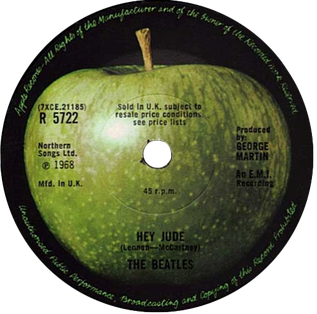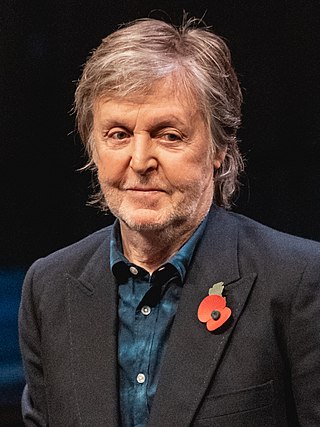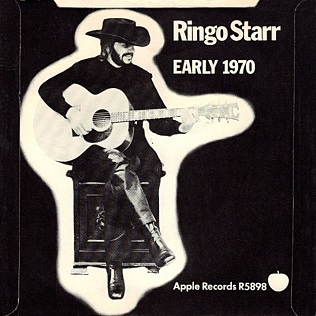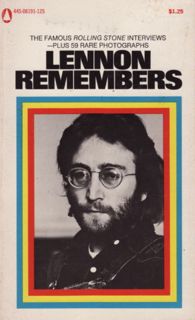
"Hey Jude" is a song by the English rock band the Beatles that was released as a non-album single in August 1968. It was written by Paul McCartney and credited to the Lennon–McCartney partnership. The single was the Beatles' first release on their Apple record label and one of the "First Four" singles by Apple's roster of artists, marking the label's public launch. "Hey Jude" was a number-one hit in many countries around the world and became the year's top-selling single in the UK, the US, Australia and Canada. Its nine-week run at number one on the Billboard Hot 100 tied the all-time record in 1968 for the longest run at the top of the US charts, a record it held for nine years. It has sold approximately eight million copies and is frequently included on music critics' lists of the greatest songs of all time.

"The Long and Winding Road" is a song by the English rock band the Beatles from their 1970 album Let It Be. It was written by Paul McCartney and credited to Lennon–McCartney. When issued as a single in May 1970, a month after the Beatles' break-up, it became the group's 20th and last number-one hit on the Billboard Hot 100 chart in the United States.

McCartney is the debut solo album by English musician Paul McCartney, released on 17 April 1970 by Apple Records. McCartney recorded it in secrecy, mostly using basic home-recording equipment at his house in St John's Wood. Mixing and some recording took place at professional London studios. In its loosely arranged performances, McCartney eschewed the polish of the Beatles' past records in favour of a lo-fi style. Apart from occasional contributions by his wife, Linda, McCartney performed the entire album alone by overdubbing on four-track tape.

"Hello, Goodbye" is a song by the English rock band the Beatles, written by Paul McCartney and credited to Lennon–McCartney. Backed by John Lennon's "I Am the Walrus", it was issued as a non-album single in November 1967, the group's first release since the death of their manager, Brian Epstein. The single was commercially successful around the world, topping charts in the United States, the United Kingdom, France, West Germany, Canada, Australia and several other countries.

"Carnival of Light" is an unreleased avant-garde recording by the English rock band the Beatles. It was commissioned for the Million Volt Light and Sound Rave, an event held at the Roundhouse in London on 28 January and 4 February 1967. Recorded during a session for the song "Penny Lane", "Carnival of Light" is nearly 14 minutes long and contains distorted, echo-laden sounds of percussion, keyboards, guitar and vocals. Its creation was initiated by Paul McCartney's interest in the London avant-garde scene and through his connection with the design firm Binder, Edwards & Vaughan.

"Things We Said Today" is a song by the English rock band the Beatles, written by Paul McCartney and credited to Lennon–McCartney. It was released in July 1964 as the B-side to the single "A Hard Day's Night" and on their album of the same name, except in North America, where it appeared on the album Something New. The band recorded the song twice for BBC Radio and regularly performed an abbreviated version during their 1964 North American tour.

"The Fool on the Hill" is a song by the English rock band the Beatles from their 1967 EP and album Magical Mystery Tour. It was written and sung by Paul McCartney and credited to the Lennon–McCartney partnership. The lyrics describe the titular "fool", a solitary figure who is not understood by others, but is actually wise. McCartney said the idea for the song was inspired by the Dutch design collective the Fool, who derived their name from the tarot card of the same name, and possibly by Maharishi Mahesh Yogi.

From August 18, 1962 to September 20, 1969, the Beatles consisted of John Lennon, Paul McCartney, George Harrison and Ringo Starr. Their break-up is attributed to numerous factors, including: the strain of the Beatlemania phenomenon, the 1967 death of manager Brian Epstein, bandmates' resentment of McCartney's perceived domineering, Lennon's heroin use and his relationship with Yoko Ono, Harrison's increasingly prolific songwriting, the floundering of Apple Corps, the Get Back project, and managerial disputes.
"I'm the Greatest" is a song written by English musician John Lennon that was released as the opening track of the 1973 album Ringo by Ringo Starr. With Starr, Lennon and George Harrison appearing on the track, it marks the only time that three former Beatles recorded together between the band's break-up in 1970 and Lennon's death in 1980. Lennon wrote the song in December 1970 as a wry comment on his rise to fame, and later tailored the lyrics for Starr to sing. Named after one of Muhammad Ali's catchphrases, the song partly evokes the stage-show concept of the Beatles' 1967 album Sgt. Pepper's Lonely Hearts Club Band.
The Apple scruffs were a group of devoted Beatles fans who congregated outside the Apple Corps building and at the gates of Abbey Road Studios in London during the late 1960s, in the hope of seeing or interacting with one of the band members. The name was coined by George Harrison. According to Apple press officer Derek Taylor, when The Sunday Times wrote a feature article on the company in the late 1960s, their map included a location for the scruffs, on the steps of the offices at 3 Savile Row.

"Give Ireland Back to the Irish" is the debut single by the British–American rock band Wings that was released in February 1972. It was written by Paul McCartney and his wife Linda in response to the events of Bloody Sunday, on 30 January that year, when British troops in Northern Ireland shot dead thirteen civil rights protestors. Keen to voice their outrage at the killings, Wings recorded the track two days later at Abbey Road Studios in London. It was the band's first song to include Northern Irish guitarist Henry McCullough.

"Back Off Boogaloo" is a song by English rock musician Ringo Starr that was released as a non-album single in March 1972. Starr's former Beatles bandmate George Harrison produced the recording and helped Starr write the song, although he remained uncredited as a co-writer until 2017. Recording took place in London shortly after the pair had appeared together at Harrison's Concert for Bangladesh shows in August 1971. The single was a follow-up to Starr's 1971 hit song "It Don't Come Easy" and continued his successful run as a solo artist. "Back Off Boogaloo" peaked at number 2 in Britain and Canada, and number 9 on America's Billboard Hot 100. It remains Starr's highest-charting single in the United Kingdom.
"Sue Me, Sue You Blues" is a song written by English musician George Harrison, released on his 1973 album Living in the Material World. Harrison initially let American guitarist Jesse Ed Davis record it for the latter's Ululu album (1972), in gratitude to Davis for his participation in the Concert for Bangladesh. When writing the song, Harrison drew inspiration from the legal issues surrounding the Beatles during the early months of 1971, particularly the lawsuit that Paul McCartney initiated in an effort to dissolve the band's business partnership, Apple Corps.

Sir James Paul McCartney is an English singer, songwriter and musician who gained worldwide fame with the Beatles, for whom he played bass guitar and shared primary songwriting and lead vocal duties with John Lennon. One of the most successful composers and performers of all time, McCartney is known for his melodic approach to bass-playing, versatile and wide tenor vocal range, and musical eclecticism, exploring genres ranging from pre–rock and roll pop to classical, ballads, and electronica. His songwriting partnership with Lennon remains the most successful in history.

"Early 1970" is a song by English rock musician Ringo Starr that was released as the B-side of his April 1971 single "It Don't Come Easy". A rare example of Starr's songwriting at the time, it was inspired by the break-up of the Beatles and documents his relationship with his three former bandmates. The lyrics to the verses comment in turn on Paul McCartney, John Lennon and George Harrison as individuals, and the likelihood of each of them making music with Starr again. In the final verse, Starr offers a self-deprecating picture of his musical abilities and expresses the hope that all four will play together in the future. Commentators have variously described "Early 1970" as "a rough draft of a peace treaty" and "a disarming open letter" from Starr to Lennon, McCartney and Harrison.

"Run of the Mill" is a song by English musician George Harrison, released on his 1970 triple album All Things Must Pass. Harrison wrote the song shortly after the Beatles' troubled Get Back sessions in early 1969, during a period when his growth as a songwriter had inadvertently contributed to the dysfunction within the Beatles' group dynamic. The lyrics reflect the toll that running their company Apple Corps had taken on relationships within the band, especially between Paul McCartney and the other three Beatles, as well as Harrison's dismay at John Lennon's emotional withdrawal from the band. Commentators recognise "Run of the Mill" as one of several Harrison compositions that provide an insight into events behind the Beatles' break-up, particularly the difficulties surrounding Apple.
"Six O'Clock" is a song by English rock musician Ringo Starr from his 1973 album Ringo. It was written by Starr's former Beatles bandmate Paul McCartney and the latter's wife, Linda, who also participated in the recording of the song. It was the first time McCartney and Starr had worked together since the Beatles' break-up in 1970. Their collaboration reflected an easing of the tensions that had existed between the two musicians for much of that period.

The Love You Make: An Insider's Story of the Beatles is a 1983 book by Peter Brown and Steven Gaines. Brown was personal assistant to the Beatles' manager, Brian Epstein, a senior executive at Apple Corps, as well as best man to John Lennon at the latter's wedding to Yoko Ono in March 1969.

Lennon Remembers is a 1971 book by Rolling Stone magazine co-founder and editor Jann Wenner. It consists of a lengthy interview that Wenner carried out with former Beatle John Lennon in December 1970 and which was originally serialised in Rolling Stone in its issues dated 21 January and 4 February 1971. The interview was intended to promote Lennon's primal therapy-inspired album John Lennon/Plastic Ono Band and reflects the singer's emotions and mindset after undergoing an intense course of the therapy under Arthur Janov. It also serves as a rebuttal to Paul McCartney's public announcement of the Beatles' break-up, in April 1970.

The Beatles: The Authorised Biography is a book written by British author Hunter Davies and published by Heinemann in the UK in September 1968. It was written with the full cooperation of the Beatles and chronicles the band's career up until early 1968, two years before their break-up. It was the only authorised biography of the Beatles written during their career. Davies published revised editions of the book in 1978, 1982, 1985, 2002 and 2009.
















